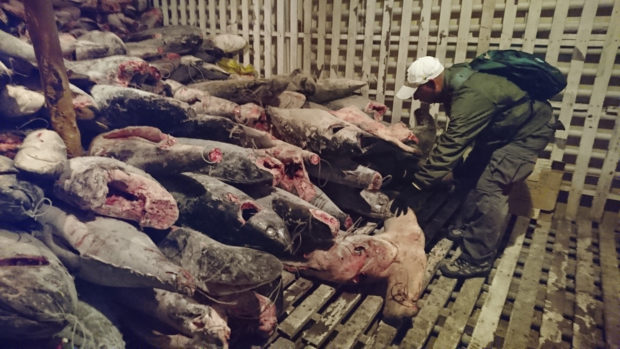Recent data show Chinese fishing fleet still near Galapagos

FILE – In this Aug. 13, 2017 handout file photo provided by Galapagos National Park, a park ranger takes part in the inspection of a Chinese flagship where 300 tons of marine species, several of them in danger of extinction, were found, in Galapagos Islands, Ecuador, as the ship and its crew are detained. In July 2020, a congregation of about 260 mostly Chinese fishing vessels near the Galápagos archipelago is stirring diplomatic tension and raising concerns about the threat to sharks, manta rays, and other vulnerable species in waters around the UNESCO world heritage site. (Galapagos National Park via AP, File)
MEXICO CITY — Satellite data indicate that a large Chinese fishing fleet remained in international waters near Ecuador’s Galapagos archipelago at the beginning of this month, even as China said it would temporarily ban fishing near the UNESCO world heritage site.
Vessel tracking data displayed on the public map created by Global Fishing Watch, a group that tracks commercial fishing vessels, shows that the fleet was massed until at least Sept. 1 along the southern border of the exclusive economic zone around the Galapagos, which extends 200 nautical miles (370 kilometers) from the islands.
That is roughly where the fleet, estimated at several hundred vessels, had been since June, escalating concerns about overfishing and the threat to vulnerable marine species in the nutrient-rich waters around the archipelago that inspired Charles Darwin in the development of his theory of evolution.
China has said the fleet is not doing anything illegal, though Foreign Ministry spokesman Wang Wenbin said on Aug. 6 that the Chinese fisheries authority would implement a ban on fishing near the Galapagos from September to November to “contribute to the protection of fishery resources in the region.”
Some conservation groups say the announced moratorium coincides with the winding down of seasonal fishing in the area anyway, and allegations that the Chinese fleet is depleting marine resources in the southeastern Pacific have fed into broader tensions between China and the United States.
Article continues after this advertisementOn Friday, U.S. Secretary of State Mike Pompeo said Washington would push back against Chinese “predatory” activity, wherever it occurs, and was supporting Ecuador in finding a solution.
Article continues after this advertisement“No one wants conflict there,” Pompeo said in an interview with conservative radio talk show host Hugh Hewitt. “Everyone wants a diplomatic resolution to this, and we have been working alongside them to help them achieve that.”
On Aug. 27, Pompeo said reports that Chinese vessels near the Galapagos were “‘disabling tracking systems, changing ship names, and leaving marine debris are deeply troubling.”
A day later, China said it had “open and friendly communication with positive results” with Ecuador over the fishing issue, and accused Pompeo of peddling false information.
China requires its fishing vessels to operate tracking systems that report locations once an hour, “which is far superior to the international practice of reporting every four hours,” the Chinese embassy in Ecuador said. No tracking system of any Chinese fishing vessel in the southeast Pacific has been turned off, “except for a few hours when the satellite signal was delayed or temporarily lost,” it said.
Ecuador’s defense minister, Oswaldo Jarrín, previously said that nearly half of the Chinese fleet had turned off its tracking systems. The Ecuadorian navy reported Aug. 31 that one of its vessels conducted exercises with a U.S. Coast Guard cutter, the USCGC Bertholf, and that the two exchanged information about “foreign” fishing fleets near the Galapagos.
At the same time, Ecuador has been heavily indebted to China for years. President Lenín Moreno on Wednesday announced another $2 billion in Chinese loans on Wednesday, following $6.5 billion in support that was agreed to with the International Monetary Fund last week. Ecuador’s economy, fragile even before it was hit by the COVID-19 pandemic and a slump in oil prices, is expected to shrink by 11 percent this year, according to the IMF.
The Chinese fishing fleet has appeared near the Galapagos for years, though the latest flotilla is among the biggest. Even if a fishing moratorium is implemented, conservationists say long-term pressure on marine life around the archipelago will only increase.
This year’s fleet fished for squid with selective lines that “only catch squid, they do not fish anything else,” said Pablo Guerrero, director of marine conservation for WWF-Ecuador. But he said he was concerned because “there is very poor monitoring over this fleet.”